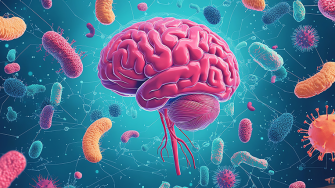
There are more bacterial cells in our body than human cells. These bacteria plus other microscopic organisms such as fungi are known as the microbiome.
The microbiome is of vital importance to our health and is linked to many human diseases and conditions. It exists in multiple sites in the body, such as the gut, the skin and the oral cavity.
"One contentious area of microbiome research is whether there is a brain microbiome, given that the brain is thought to be a sterile organ due to the presence of the protective blood-brain barrier."
However, it’s interesting to note that neurodegenerative diseases, such as Alzheimer’s disease, can perturb the blood-brain barrier, which may allow bacteria to enter the brain and potentially contribute to disease development. Indeed, scientists are actively investigating the brain infection Alzheimer’s disease hypothesis, which posits that microbial infection plays a causal role in the disease.
At CHeBA we are currently investigating the brain microbiome in postmortem samples from people who had Alzheimer's disease and healthy individuals with no known brain or neurological diseases. We have found that in general, no substantial differences in types of bacteria exist between Alzheimer's cases those individuals that are healthy.
Nevertheless, some studies found a higher abundance of certain bacteria in Alzheimer's disease brains. These included oral bacteria, such as Porphyromonas gingivalis and Streptococcus, which are detected in cavities and gum infections. This observation supports the hypothesis that poor oral health is implicated in Alzheimer’s disease.
One investigation focussed only on a single bacterium that is responsible for Lyme’s disease, Borrelia burgdorferi. This bacterium was found in a small group of Alzheimer's disease brains only and not in any of the brains of people without neurological disease. However, this work requires replication in independent studies for us to build confidence in the scientific merit of results.
The brain microbiome is only just beginning to be investigated and it is an exciting field for us to be researching. There are many obstacles to overcome, including minimising sample contamination during collection and extraction and optimising microbiome examination techniques.
"Microbiome researchers apply something known as metagenomics as a cutting-edge method to discover the complete microbial map within the brain. This method enables experts to recognise species-level bacteria, thus generating detailed information about microbe composition. An alternative relatively new and extremely sensitive technique is metaproteomics, which detects the presence of bacterial peptides and proteins."
Our focus in the year ahead will be optimising these techniques to define the brain microbiome in both neuropathologically healthy brains and Alzheimer’s disease cases across different brain regions. The aims to elucidate whether the brain microbiome is present in the healthy brain and the Alzheimer’s disease brain, potentially suggesting novel prevention and treatment strategies and possibly shedding light on causal mechanisms in Alzheimer’s disease in the future.
This work is undertaken by CHeBA PhD student Arnav Bhattacharya, under the supervision of Dr Karen Mather, Dr Claire Shepherd and Dr Fatima El-Assad.
Further information
Journal article: Bacteria in the brain: do they have a role in the pathogenesis of Alzheimer's disease?

